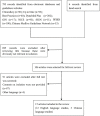How are countries responding differently to COVID-19: a systematic review of guidelines on isolation measures
- PMID: 37719732
- PMCID: PMC10502310
- DOI: 10.3389/fpubh.2023.1190519
How are countries responding differently to COVID-19: a systematic review of guidelines on isolation measures
Abstract
Introduction: Isolation strategies have been implemented in numerous countries worldwide during the ongoing community transmission of severe acute respiratory syndrome coronavirus 2 (SARS-CoV-2). However, various countries and organizations have implemented their isolation measures at varying intensities, even during the same period. Therefore, we systematically reviewed the key information contained in currently available guidelines regarding the isolation of the general population, aiming to better identify the heterogeneity of the current isolation strategies.
Methods: We conducted searches in four evidence-based medicine (EBM) databases and five guideline websites to identify guidelines, guidance, protocols, and policy documents published by authoritative advisory bodies or healthcare organizations, which provided information on the implementation of isolation for general populations with COVID-19. One author extracted data using a standardized data extraction checklist, and a second author double-checked all extractions for completeness and correctness. Discrepancies were resolved through discussion. The information extracted from the included articles was summarized both narratively and using tables.
Results: We included 15 articles that provided information on isolation measures recommended by nine different countries and organizations. The included articles consistently recommended isolating individuals with a positive COVID-19 test, regardless of the presence of symptoms. However, there were variations in the duration of isolation, and substantial differences also existed in the criteria for ending the isolation of COVID-19 patients.
Conclusion: Different countries and organizations have substantial differences in their isolation policies. This reminds us that scientifically sound guidelines on isolation that balance the risk of prematurely ending isolation with the burden of prolonged isolation are a crucial topic of discussion when faced with a pandemic.
Keywords: COVID-19; guidance; guidelines; isolation; systematic review.
Copyright © 2023 Xie, Wang and Zhang.
Conflict of interest statement
The authors declare that the research was conducted in the absence of any commercial or financial relationships that could be construed as a potential conflict of interest.
Figures
Similar articles
-
The future of Cochrane Neonatal.Early Hum Dev. 2020 Nov;150:105191. doi: 10.1016/j.earlhumdev.2020.105191. Epub 2020 Sep 12. Early Hum Dev. 2020. PMID: 33036834
-
Beyond the black stump: rapid reviews of health research issues affecting regional, rural and remote Australia.Med J Aust. 2020 Dec;213 Suppl 11:S3-S32.e1. doi: 10.5694/mja2.50881. Med J Aust. 2020. PMID: 33314144
-
Effectiveness and cost-effectiveness of four different strategies for SARS-CoV-2 surveillance in the general population (CoV-Surv Study): a structured summary of a study protocol for a cluster-randomised, two-factorial controlled trial.Trials. 2021 Jan 8;22(1):39. doi: 10.1186/s13063-020-04982-z. Trials. 2021. PMID: 33419461 Free PMC article.
-
COVID-19-specific adult basic life support guideline strategies for chiropractors and other healthcare providers to maximize the safety and efficacy of resuscitation: a commentary.Chiropr Man Therap. 2023 Jun 5;31(1):16. doi: 10.1186/s12998-023-00488-y. Chiropr Man Therap. 2023. PMID: 37277875 Free PMC article. Review.
-
A Review on Mode of Delivery during COVID-19 between December 2019 and April 2020.Am J Perinatol. 2021 Mar;38(4):332-341. doi: 10.1055/s-0040-1721658. Epub 2020 Dec 7. Am J Perinatol. 2021. PMID: 33285608
Cited by
-
Health Preferences in Transition: Differences from Pandemic to Post-Pandemic in Valuation of COVID-19 and RSV Illness in Children and Adults.Children (Basel). 2025 Jan 31;12(2):181. doi: 10.3390/children12020181. Children (Basel). 2025. PMID: 40003283 Free PMC article.
-
Factors associated with the worsening of COVID-19 symptoms among cohorts in community- or home-isolation care in southern Thailand.Front Public Health. 2024 Mar 20;12:1350304. doi: 10.3389/fpubh.2024.1350304. eCollection 2024. Front Public Health. 2024. PMID: 38572011 Free PMC article.
References
-
- World Health Organization. WHO Coronavirus (COVID-19) Dashboard. (2022). Available online at: https://covid19.who.int/ (accessed December 20, 2022).
Publication types
MeSH terms
LinkOut - more resources
Full Text Sources
Medical
Miscellaneous


